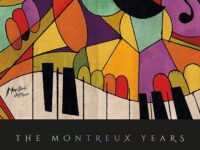It seems that in the early seventies, many of the notable jazz musicians of the sixties went electric and dabbled in fusion. Though Stan Getz enjoyed a second wind in the sixties with his groundbreaking introduction of Brazilian bossa nova to American audiences who eagerly lapped it up, this would hardly be the end of him treading into new territory, which he did again in that following decade.
Chick Corea had played in Getz’s band around 1967 but four years later offered to return to his band and bring with him his Return to Forever co-founder Stanley Clarke and Lifetime linchpin Tony Williams. The master tenor saxophonist’s openness to new forms of music already demonstrated by his Brazil sojourn and a fondness for Corea compositions made him very receptive to the idea. That opened up a short, underappreciated and very fruitful chapter of Stan Getz’s career.
The band gigged pretty heavily (sometimes with percussion extraordinaire Airto Moriera) in the ’71-’72 timeframe, playing in a style of jazz where Return to Forever Mk I and Stan Getz met halfway. Well, perhaps more than halfway toward RTF, but Getz’s buttery sax fit as well with this lightly Brazilian styled fusion just as well as he meshed with João Gilberto nearly a decade earlier. The Corea-Getz partnership was consummated with Getz’s Captain Marvel (1972), which contained nearly all fresh Corea songs. Some of these songs appeared on the first two RTF albums, both of which appeared the same year as Captain Marvel.
1972 was also the year that Getz took his killer band to the Montreux Jazz Festival, and the performance was documented on video. Recently, the footage was made available in an hour-long DVD via Eagle Rock Entertainment. Live At Montreux 1972 displays four musicians: one legend and three well on their way toward becoming legends, playing up to their reputations. Corea mans a Fender Rhodes for most of the gig, leaving it idle in favor of a grand piano only for Billy Strayhorn’s “Lush Life,” as Clarke sticks with acoustic bass. Getz on his tenor sax and Williams behind the drum kit round out this supergroup.
The repertoire nearly duplicated the song lineup of Marvel, save for replacing “Five Hundred Miles High” with another Corea gem “Windows” (dating back to Corea’s earlier Getz stint) and a lovely rendition of “I Remember Clifford.” Corea is very crisp on the Rhodes, especially on “Windows,” and Getz is Getz, effortlessly blowing his trademark licks in a tone that’s often copied but never quite replicated. That said, the most enjoyable moments come from the rhythm section.
Williams had just disbanded a very explosive rock-jazz band in Lifetime, but returns to a milder form of jazz with the same sort of mastery. He slays the Latin rhythms of “Captain Marvel” and “Time’s Lie,” while Clarke’s instantly recognizable bass language gets a noted spotlight on “Day Waves,” and his arco work acts as a lower, second voice to Getz for “Lush Life.”
The video quality is quite good, and the odd pan or two can easily be forgiven because of all the close ups of the musicians cutting it up. Live At Montreux 1972 is a welcome document of a band that made Stan Getz sound younger and revitalized. Alternately, this can be seen as a nascent Return to Forever band with a peerless drummer and fronted by a pretty good saxophone player. Either way, it’s great entertainment.
[amazon_enhanced asin=”B00FEI1X2C” /] [amazon_enhanced asin=”B0012GMZ3Q” /] [amazon_enhanced asin=”B0000262QW” /] [amazon_enhanced asin=”B0000046YK” /] [amazon_enhanced asin=”B0000047E7″ /]
- Claudio Scolari Project – ‘Bloom’ (2025) - June 12, 2025
- Denny Zeitlin – ‘With a Song In My Heart: Exploring The Music of Richard Rodgers’ (2025) - June 4, 2025
- Ches Smith Quartet – ‘Clone Row’ (2025) - May 30, 2025



